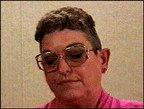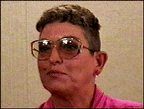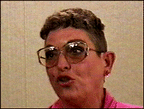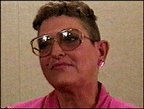 up to Contents of this Page
up to Contents of this Page
Virginia's Diagnosis

Because of her family history, Virginia had been followed closely for the past 18 years. When she found a lump, she immediately went to her health care provider to seek a diagnosis.
Virginia was asked to join a clinical trial that included pre-operative chemotherapy followed by a lumpectomy and radiation. She had many decisions to make about her treatment.
Learning to be a care-taker instead of a care-giver was hard at first for Virginia. But she feels it is important for recovery to let people do things for you and to learn to do nice things for yourself.
Virginia's Introduction: Take time to make your decision
Time to make an intelligent decision is probably one of the most important things. Most of us who are diagnosed with cancer believe that we need to have surgery immediately. My doctor reassured me that it took eight years for that cancer to get to be that size, and another three weeks to make an intelligent decision is not going to hurt one way or the other. I think there probably is one type of breast cancer that does rapidly advance, but the majority of them don't. And Dr. Susan Love quotes in her book that any doctor who recommends that a woman have immediate surgery has a convenient opening in his surgery schedule, and I concur with that.
Virginia's Introduction: Take someone along
The diagnosis is devastating and you're not thinking at all. So its very important when you go to a doctor to take along someone who will take notes about what the doctor said. I was a patient advocate for a patient last year. She called the doctor and said "I'm having a patient advocate come with me." And its surprising how different that woman was treated because I was there. He tried to explain medical facts that I really don't think he would have done without me there. She had a difficult time understanding, and I saw that they weren't getting it, so I finally said to him we're going to lunch afterwards and I will explain it. That type of support is so important.
Virginia's Introduction: My mother and aunts had cancer
My mother was diagnosed with breast cancer at age 50, had radical surgery and cobalt treatment. She then had metastatic cancer to the bone and the brain, and survived for five years. But I also have a history of breast cancer. In my mother's family I have an aunt, she lived probably eight years after diagnosis. But then I have another aunt from the same side of the family that had double mastectomy and cobalt treatments, and she is still living and she's in her 80's.
Virginia's Introduction: I asked others about lumpectomy
I had to do some quick research on lumpectomy versus mastectomy and the long-term survival. And because I went to the support group at the hospital, I was able to meet a woman there who had a lumpectomy five years ago. I spent a lot of time with her discussing her decision, why she made it, where she went to have her surgery. And of course, then I delved really deep and met another one of the doctor's patients and we had some long, long talks. Before I had my surgery, I met her. I wanted to meet her because I wanted to see what her surgery looked like. I wanted to know what I was going to look life after I had surgery. She helped tell me what you go through. I was real happy with the decision I made and knew I was in good hands, and that's very, very important.
Virginia's Diagnosis: Prophylactic mastectomy
I, of course, went for yearly check-ups. And at a very young age, my family physician detected thickening and he referred me to a surgeon in town. Then that surgeon followed me 18 years. I had mammography every year. But after being followed for 18 years, there was a time where I had considered prophylactic mastectomy, and then we decided against that because of my young age.
Virginia's Diagnosis: I wanted the best doctor
Well, I was 50 years old and I had just retired from Michigan Bell in January, and in February I found a lump. I wanted the best doctor around. Losing the surgeon that had followed me for so long, I wanted someone good and I kept calling and couldn't get in. So I kept on. January 31st I begged the office staff to take me - and they did take me - and I couldn't get in until May.
Virginia's Diagnosis: Abnormal bleeding
In 1989, I had my last mammography. I started having mid-life menopause, pre-menopause symptoms. I had some abnormal bleeding and heavy bleeding. I allowed a doctor to put me on progesterone treatment only. Within twelve months, I had a 2.5 centimeter tumor. I was diagnosed with fine needle aspiration.
Virginia's Diagnosis: The doctor was 90% sure
She was about 90% sure just by the mammography that I had malignancy, but she chose to do fine needle aspiration. It was really nothing. No pain. I had a little bit of black and blue from the needle, but other than that there was really no pain at all. She told me that she would call me immediately. The next afternoon she notified me herself. She went right to the lab and called me at home and talked briefly about the treatment at that time what my options were and gave me some time to think about it.
Virginia's Treatment: I had axillary node dissection
I had a modified mastectomy. That means they live some muscle for you to move around later, otherwise they take the whole thing out. And my breast wasn't that big to start and the doctor said we could remove the tumor out and an inch around it, all the way around it, and then not much left. Or, remove the whole breast. I said remove the whole thing. I don't want anything left there. So remove the whole thing. And he said you can either get chemotherapy or radiation treatment. Radiation treatment you have to go there every day for six weeks, something like that. Gee, that sounds like a lot of work. I take chemotherapy.
Virginia's Treatment: Lumpectomy is wonderful
If you choose to have a lumpectomy, still you know, you're going to live a normal life, you're going to look normal. Cosmetically, its wonderful. I just went to have a six month check-up at my radiation oncologist and, of course, saw a PA who did the exam. And she looked at me and she said, on which breast did we do surgery on? You couldn't see hardly immediately after surgery. And if in the future we do have to do surgery again and have a mastectomy as the next option, I still fully believe that had I have to make the decision again, it would still be a lumpectomy, because I look at myself in the mirror everyday and say, thank you God for sending me to the surgeon who helped me make this decision.
Virginia's Treatment: I had pre-op chemotherapy
I chose to have pre-op chemotherapy and be on a clinical trial, and that was a big decision to make also. Had my mother been able to be a part of a clinical trial, maybe it wouldn't have been so difficult these days. I really didn't want to be a pre-op chemotherapy patient, but then I had done some research and found that in the majority of the cases the tumor did decrease in size. So when they called me and told me that I was on the pre-op arm, I was ecstatic. I had started my treatment right away after that.
Virginia's Treatment: Someone who's been there
The counselor knew the patient. Its always helpful to have someone who's been there. Because of the work that I do, I had really seen some terrible, terrible mastectomy surgeries. In the support group I see a lot of women who are going through that, and it just takes one person to go ahead and have that surgery and be real positive about it. I think our first woman in our support group was 72 years old, very big, large busted woman. And she came back and showed us her surgery and she said, I play golf. That gets in my way and they're hot, so at 72 I'm going to do this. You want to talk to someone who's been there, who is going through the same thing that you're going through.
Virginia's Treatment: The black marks were a bother
They radiated me from two different sides and there's no pain. Radiation is no pain at all. They just lay you on the table with your arm up and they mark all over your breast with black markings, and they lay a mold underneath to conform to the way you have to be laying on the table when you have your radiation. Most people are apprehensive about that, when the mold is being taking and the markings are all being done. The black markings were something that bothers a lot of people, and it bothered me, too, because I was afraid of losing all those marks when I showered. And of course, the hot flashes, perspiration destroyed them, too. But they just go on ahead and they just mark you up again.
Virginia's Treatment: Radiation was a breeze
Radiation therapy is a real breeze. There's nothing to radiation therapy, but I was apprehensive about it. Now this is a 28 day treatment. Monday through Friday you go to the hospital for a 30 second treatment. I had a roll of toilet paper at home. Every day that I came home, you rip off a piece of toilet paper and then you can count how many more days you have left. I did not have any side effects from the radiation. I did not get tired, I did not get nauseated, I went on with my life. I think the hardest part is when you're done, because now you've gone through all the treatment. You're on your own, you're back out in society and the doctor's appointments aren't there anymore. In fact, before I finished my radiation therapy treatment, I was volunteering in radiation oncology at the hospital.
Virginia's Treatment: I was scared of chemotherapy
I was scared of chemotherapy. I really was. And of course, all of the side effects, the loss of hair is probably one of the most difficult things to deal with. But I did some more research and I read a book called "Coping with Chemotherapy." It gave some real good tips on what to do, how to eat, what to eat to diminish the side effects of the chemotherapy. I would go in for my treatment in the morning, I would eat breakfast before I left. I would sit there and have my chemo and after the chemo, I walked out of there and I said we're going to a restaurant, I'm hungry. But the rest of the day I don't remember because you have all those extra drugs to make you calm. You go to bed and you sleep 3-4 hours and I was up again, eating again.
Virginia's Treatment: There are risks in everything
I was concerned about the long-term effects of Tamoxifen. Tamoxifen is an anti-estrogen suppressor. It has its side effects, it has a weight gain, it causes your metabolism to go all the way out of whack, hot flashes. But, four years out, those are subsiding and they're tolerable. And I have had some problems with abnormal uterine bleeding, probably caused by the Tamoxifen, but I knew that when I started it. There is small incidence of occurrence of uterine cancer when you're on Tamoxifen, but there are risks in everything you do.
Virginia's Recovery: Friends and family
Friends, other than people who have cancer, they don't understand. The best thing that you can do is bring food. That was very, very important for me. I love to eat, but I didn't want to cook. And a hug. A hug is real important. My daughter went through the same thing that I went through when my mother was diagnosed. She was supportive but she still wanted to go on with her own life. And really, it comes at a time in your life when it interferes with your own particular life style. So I could understand that. My husband is there for me. He was very knowledgeable on the type of treatment that I chose, but as far as really delving into as much as I did, no, he left that to me. I can understand. Its difficult for a man because he's scared he's going to lose me and he doesn't want that.
Virginia's Recovery: Be careful about lymphedema
Any type of infection can cause lymphedema and you must be very careful after surgery. You should carry Neosporin with you at all times. If you get a scratch, you need an antibiotic immediately. You never shave under your arm with a regular razor. You always use an electric razor. You don't garden without gloves on. If you get a paper cut you take care of it immediately. Last fall I was walking and I fell on the street and had a compound fracture and the first thing I thought of I've got to do something immediately so I don't get infection. I have a girlfriend who got it from her cat scratching her and she was like two and a-half years post-op. Lymphedema can come anytime post-operatively. I've seen women four years out develop a case of lymphedema.
Virginia's Recovery: I treated myself
I felt so good after surgery that I just wanted to go on with my life and do everything that I did before. I came home from the hospital on a Sunday and I went and ironed on Sunday afternoon. I mean, when I got home I did do a lot of resting. I was tired, but I still went on, tried to go on with my life. I had always put my family, my husband and my daughter first in my life, as most mother's do. I decided it's my turn, that it was time for me to take time for myself. So I did everything that made me feel good. I treated myself a lot. One of the things I did was I had a massage and it just felt wonderful. And I did all kinds of things to treat me, to make me feel better.
Virginia's Recovery: Its hard to become number one
As women and mothers, we're brought up to be care-givers and not care-takers. And once you're diagnosed with cancer, you have to become a care-taker. I'm important, I'm number one now. I think really you become a little bit selfish, and that bothers me. I don't know, I haven't learned how to deal with that yet, being a number one rather than a number two. But, I want to see everything, I want to do everything that I've never done before. I want to travel. I want to go see plays. Things that weren't important to me before are very, very important now. I do thrift shopping and I love to thrift shop. I go do something like that and I'm uplifted because I find a bargain and that just puts me in heaven. And I look back and say, gee, I would like to be the Virginia I used to be, but I never will be.
 up to Contents of this Page
up to Contents of this Page
Virginia's Treatment

 up to Contents of this Page
up to Contents of this Page
Virginia's Recovery

![]() Return to Virginia's Outline
Return to Virginia's Outline
![]() Return to Virginia's Outline
Return to Virginia's Outline
![]() Return to Virginia's Outline
Return to Virginia's Outline
![]() Return to Virginia's Outline
Return to Virginia's Outline

 Listen to Virginia share a cancer experience in her own words. (456 K .au file)
Listen to Virginia share a cancer experience in her own words. (456 K .au file)
